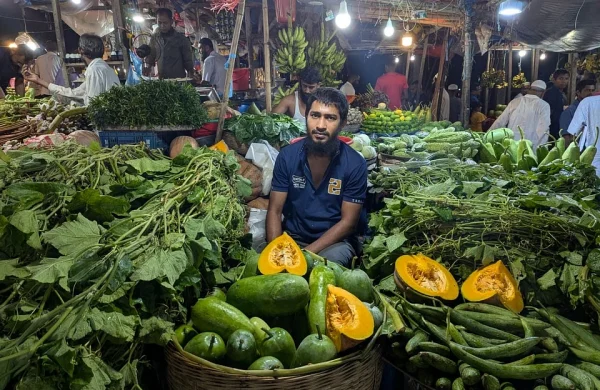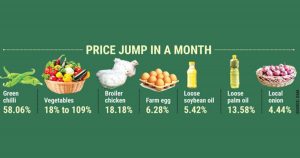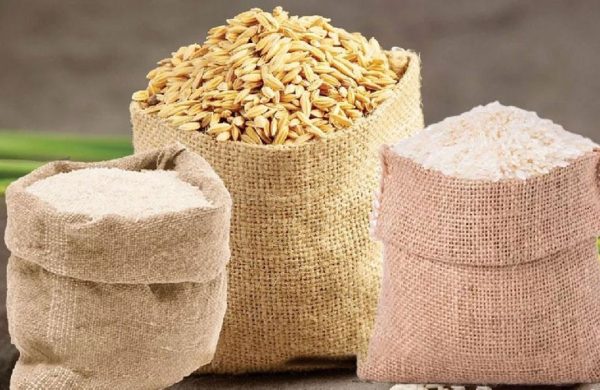Soaring essential prices squeeze household budgets
- Update Time : Friday, October 11, 2024

Experts blame lack of govt measures
TDS Desk:
Mehedy Hasan, an employee of a private company, stepped into a kitchen market with plans to buy small quantities of yardlong bean, green papaya, and green banana with Tk150 to prepare a mixed vegetable dish. However, his plan to include brinjal in a fish curry was quickly dashed when he discovered its staggering price of Tk160 per Kg. “I just couldn’t afford it,” he lamented.
Another consumer, Ariful Islam, shared a similar frustration, saying, “Recently, I’ve been eating more and more potatoes, because prices of all kinds of vegetables have skyrocketed.”
As vegetable prices continue to soar while other essential products’ prices remain high for a long time, consumers are forced to make compromises to keep up with their limited budget.
After the interim government took charge on 8 August, following the ouster of the fascist Awami League government in face of a mass uprising, prices of essential commodities declined for a couple of weeks, but they have surged further in the recent weeks.
Prices of most vegetables have increased – the highest reported at 108.7% – in a month, according to the statistics of the Department of Agricultural Marketing (DAM).

Courtesy image
Experts argue that the interim government has not prioritised a long-term plan for stabilising the supply chain and controlling commodity prices as effectively as needed. As a result, prices of key items have already risen significantly, leaving the government struggling to manage the market.
Now, two months after taking office, the government is implementing notable measures, including reducing duties and taxes on certain products and increasing market monitoring efforts. Besides, taskforces have been set up in different districts, but prices of essentials like cooking oil, sugar, egg, and vegetable remain high, burdening many people.
Dr Khondaker Golam Moazzem, research director of the Centre for Policy Dialogue (CPD), told that vegetable production is affected whenever there are floods in the country, leading to price hikes. In addition to that, he also blamed syndicates for the soaring prices.
“Every year around this time, we see a rise in vegetable prices. The most significant reason is that the market is controlled by only a few suppliers. During this period, we can consider using alternative imperishable products like potatoes,” he said.
However, the situation is different when it comes to eggs and poultry. “After the announcement of importing the product, egg prices have dropped slightly, but they haven’t returned to the previous level,” he said.
“Major initiatives in supply chain management are needed, but we tend to think only of short term initiatives. Even under the current government, I haven’t seen any significant market control initiatives.”
He further emphasised the importance of developing supply chains across different markets, reforming government systems, changing laws, and creating proper operational and monitoring mechanisms. “These efforts need to be pursued with a 4-5 year target in mind, but I haven’t seen any such initiatives being taken.”
Agricultural economist Dr Jahangir Alam Khan told that currently the transitional period between the summer and winter vegetable production seasons is going on. On the other hand, floods in different phases in the country’s northern, eastern and some other regions also affected vegetable production vastly.
“The winter vegetable production is yet to begin while the summer vegetables have been harvested from the fields. The government should encourage farmers to produce early varieties of winter vegetables. The prices of vegetables will start to decline soon after the winter vegetables appear within one month,” he said, adding that the food inflation in the country may increase this month if the current situation continues.
SM Nazer Hossain, vice president of Consumers Association of Bangladesh (CAB), told that prices of essentials have been increasing indiscriminately as syndicates have spread across the country at the root level.
VEGETABLE PRICES SOAR AS HIGH AS 108PC
The price of loose soybean oil increased by 5.42% in a month and currently sells at Tk153-158 per litre, while loose palm oil price increased by 13.58% during that period and sells at Tk148-153 per litre, according to the Department of Agricultural Marketing (DAM).
Local onion prices increased by 4.44% in a month and sold at Tk110-125 per kg yesterday.
During the same period, the price of green chilli increased by 58.06%, green papaya by 30.77%, pumpkin by 47.06%, snake gourd by 68.2%, imported tomato by 108.70%, taro (kachu mukhi) by 25%, yardlong bean by 100%, gourd by 18.18%, wax gourd by 30%, cucumber by 33.33%, bitter gourd by 53.85%, pointed gourd by 50%, okra by 60%, spiny gourd by 61.54%, sponge gourd by 60% and ribbed gourd by 30.77%, according to DAM.
The price of Sonali chicken increased by 14.89%, broiler chicken by 18.18% and farm egg by 6.28% in a month, according to DAM.
The price of broiler chicken was Tk190-200 per kg, Sonali chicken was Tk280 per kg, layer chicken was Tk310 per kg and endogenous chicken was Tk550 per kg at the kitchen market at Mirpur 6 on Thursday.
The farm egg price declined to Tk160 per dozen from Tk170-180 per dozen within a day, after the government permitted importing 45 million eggs.
Summer vegetables like taro (kachu mukhi) sold at Tk70-80 per kg, brinjal at Tk120-160 per kg, bitter gourd at Tk120 per kg, and yardlong bean at Tk150 per kg on Thursday. Common vegetables like okra, sponge gourd, ribbed gourd, pointed gourd, and snake gourd sold at Tk100 per kg. Bottle gourds sold at Tk100 per piece, and green papaya at Tk30-40 per kg.
Winter vegetables also witnessed price hikes as bean sold at Tk300 per kg, tomato at Tk260 per kg, carrot at Tk180 per kg, cauliflower at Tk80 per piece, cabbage at Tk80 per piece and radish at Tk60 per kg on that day.
Local onions sold at Tk120-135 per kg, imported onion at Tk120 per kg, garlic at Tk220 per kg, and potato at Tk60 per kg at the Mirpur 6 kitchen market.
Cucumber sold at Tk80 per kg, mint leaf at Tk500 per kg and coriander leaf at TK 500 per kg.
A week earlier, taro (kachu mukhi) sold at Tk70-80 per kg, brinjal at Tk100-120 per kg, bitter gourd at Tk70-80 per kg, yardlong bean at Tk120 per kg, okra, sponge gourd, and snake gourd at Tk80 per kg, bottle gourds at Tk50-70 each, papaya at Tk30-40 per kg, tomato at Tk140-160 per kg, carrot at Tk160 per kg, and radish at Tk60 per kg.
Local onions sold at Tk120 per kg, ginger at Tk280 per kg, garlic at Tk220 per kg, and potato at Tk60 per kg a week earlier.













